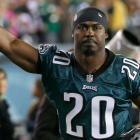Brian Dawkins has had an unforgettable year. The former Pro Bowl safety saw his longtime team, the Philadelphia Eagles, win the Super Bowl in February. He passed the torch as unofficial Eagles hype man and front-office executive to pursue philanthropy. And now he's preparing for induction into the Pro Football Hall of Fame as one of the fiercest talents of his generation.
Had it not been for a psychiatrist, one of his former coaches and a renewed Christian faith, however, the 44-year-old Dawkins may not have made it to 2018. In fact, he may not have made it past 25.
Reflecting on his five-time All-Pro career for an NBC Sports Philadelphia special, Dawkins recently told Derrick Gunn that his journey was not always destined to run through Canton. On the field, No. 20 was an unceasingly impassioned presence, complete with pregame speeches and highlight-reel hits. But off the field, as told to Gunn, Dawkins was "waging war with himself."
An indefinite fan favorite in Philly, Dawkins was married in 1994, two years before his rookie season with the Eagles. And during that rookie year, he faced pressure from every direction -- pressure to overcome spousal differences, to manage "anger issues," to raise a "colicky baby" and, of course, to survive in the NFL.
"Overall, I didn't have any outlets, and so I began to drink a little more than I needed to, and that quickly spiraled down into depression," Dawkins said, per Gunn. "I went through a real dark, deep depression ... There were times I didn't even want to be around my family, didn't want to be around my son. I just wanted to be in a dark room by myself with nobody."
And that, Dawkins continued, led to thoughts of suicide.
"That's where suicidal thoughts came in," he said, "and then actually planning out how I would go about it in such a way that Connie (his wife) and my son would get the money from my insurance policy."
Help arrived, however, in the form of former Eagles defensive coordinator Emmitt Thomas, who currently coaches the Kansas City Chiefs' defensive backs. Thomas and his wife helped the safety find a psychiatrist, according to Gunn. Medications followed, but the real fix came when Dawkins sought something greater.
"I rededicated my life," he said. "(I was) able to deal with that through my renewed faith. Going to more and more Bible studies. Giving my life over to the Lord completely helped me go on to become the athlete I became and the person I became."






















